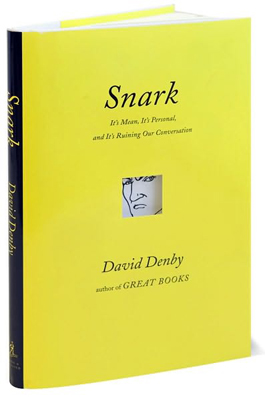home | metro silicon valley index | the arts | books | review

Gotcha
Reviewed by Richard von Busack
TOO OFTEN, the simple one-syllable word snark has been used to trivialize the honest sentiments of a journalist. Destined to be remembered as the stodgier of The New Yorker's two film critics, Denby gives a pocket-size history of fury in print in his new book, Snark. He begins with a pair of Greek Anthology footnotes named Arilochus and Hipponax and ends in the 24-hour imbroglio on the Internet. Favoring some sharp wits (Juvenal, Pope) and missing some others (Bierce, Wilde), Denby makes a measured complaint against the ambient meanness in today's discourse. That's what happens when you cast a wide net. He lumps in every pinhead texting "ha ha UR so gay" to some mother's precious darling with the shrewd savages lurking at various websites.
The blogs are battles of wits that the unarmed must avoid. Some people don't understand how the insult pre-emptive—used defensively by African Americans for many centuries—keeps things equal. When Wonkette.com addresses our new prez as "Hopey the Magic Unicorn" or "Our caliph" or makes repeated reference to the true fact of one Florida imbecile's malapropistic homemade lawn sign ("Obama is a half-breed muslin!"), they're just trying to spit enough to drown their nemeses.
This is what Denby calls "negative energy." He is good at dissecting the nasty and unfunny side of Maureen Dowd, or explaining that a sexual double standard is essential for someone throwing dung in print. Once the Republicans were derided for being dickless, and now they are insulted for being perverts. (The same double standard went for Bill Clinton, according to the right-wing foamers.)
Denby's nostalgia for '40s wisecracks and Will Rogers' joshing is sweet, but beside the point. S.J. Perelman once suggested that Rogers' "I never met a man I didn't like" could be used at the bottom of a sliding scale of humor. The top, he said, would be Oscar Wilde's seven-word description of British fox hunters: "The unspeakable in pursuit of the inedible." Denby would count the latter as snark and the former as humor—or would he? He's the one carrying the calipers. What he's measuring changes throughout the short duration of this book-length essay. (By David Denby; Simon & Schuster; 128 pages; $15.95 hardback)
Send a letter to the editor about this story.
|
|
|
|
|
|